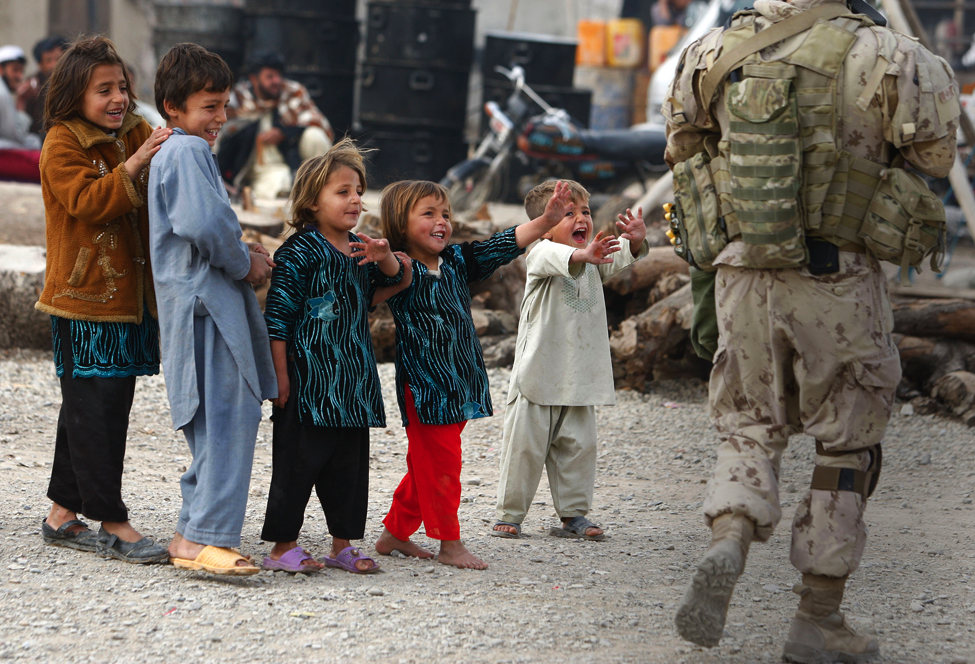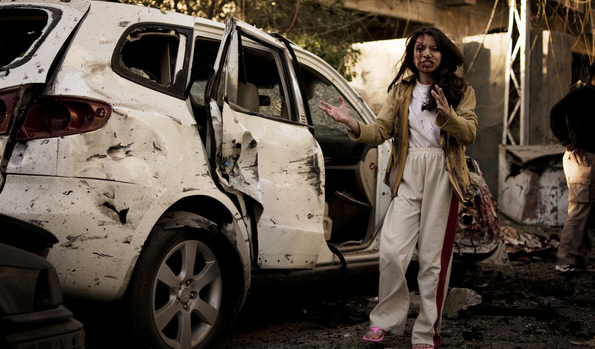The war in Iraq has moved on to Afghanistan and the (relatively few) pictures we are being shown from there lately, such as the one above, tend to depict a somewhat ordered and ordinary, workaday world—at least for what we imagine everyday life in Afghanistan to be like. The U.S. military seem more like police officers than an occupying force—delighting local children, gathering information, searching out bad guys, and so on. And for the locals it seems like business as usual, with weekly Shura’s, sellers pedaling their wares in the marketplace, etc. The Taliban is still a threat, of course, and has to be sought out and neutralized, but all in all, things seem to be going well for our troops who take out time to exercise, help locals with development projects, and look forward to returning home once the job of security is turned over to local police—or so the photographic record would seem to suggest. Of course, this all ignores the nearly 600 US and allied soldiers who have died in Afghanistan in the past year, including more than 40 in the last month alone—or for that matter the nearly $300 billion dollars we anticipate spending to support the occupation in 2010 alone—but there is a different point to be made.
The photograph below appeared on the front page of the NYT. One might imagine that it records a severe car crash somewhere in the western world. The car is an SVU and the girl, bloodied and in distress, nevertheless bears all the markings of a western, middle-class or higher existence—notice the clean blouse, stylish sweat pants, and colorful sandals. But there’s the rub, for we would almost never see such a photograph of a U.S. citizen, at least not in the mainstream press, and not of members of middling or upper classes (and certainly not of children). That fact alone should clue us to locating the image in another world—distant and distinct from our own, both physically and culturally.
The caption solves the mystery, as it notes that “A girl sought help on Monday after three bombs exploded within about 10 minutes during Baghdad’s afternoon rush, killing her mother.” The bombing was the result of a regular and coordinated effort by the insurgency to undermine the state’s authority in the face of upcoming parliamentary elections. From whom the young girl is “seeking help” is not exactly clear, but the photograph’s oddly prominent position above the fold without an accompanying front page story makes it seem that somehow a visual demand is issuing forth from the national unconscious – a vivid reminder not only that all is not well in Iraq, but forever how much we would like to move on from involvement there, we simply cannot. And perhaps this is as it should be, for there is no question but the U.S. must bear a large portion of the responsibility for the current political instability and insurrection in Iraq. And that responsibility does not abate simply because we chose to leave, having declared our mission a success.
The repressed, it seems, always returns. And that should give us pause as we witness the photographic record of how well things seem to be going in Afghanistan.
Photo Credit: Kirsty Wigglesworth/AP; Ayman Oghanna


Discussion